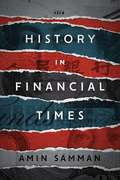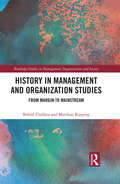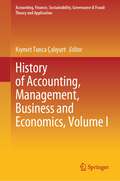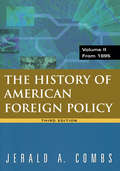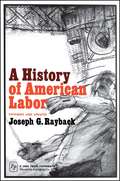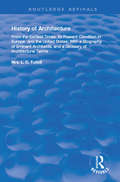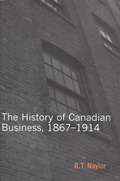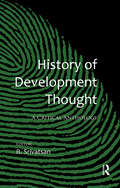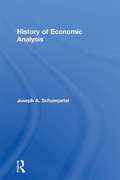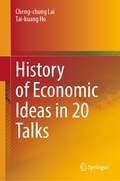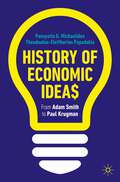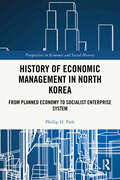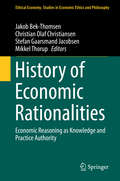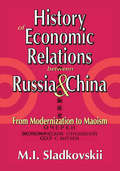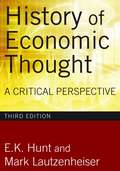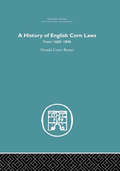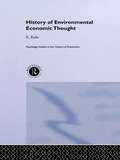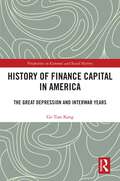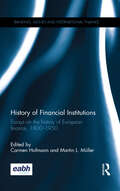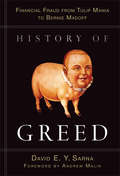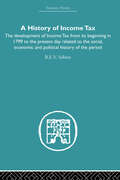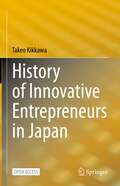- Table View
- List View
History and Value: The Clarendon Lectures and the Northcliffe Lectures 1987
by Frank KermodeUniversity lectures on literature and art
History in Financial Times (Currencies: New Thinking for Financial Times)
by Amin SammanCritical theorists of economy tend to understand the history of market society as a succession of distinct stages. This vision of history rests on a chronological conception of time whereby each present slips into the past so that a future might take its place. This book argues that the linear mode of thinking misses something crucial about the dynamics of contemporary capitalism. Rather than each present leaving a set past behind it, the past continually circulates through and shapes the present, such that historical change emerges through a shifting panorama of historical associations, names, and dates. The result is a strange feedback loop between now and then, real and imaginary. Demonstrating how this idea can give us a better purchase on financial capitalism in the post-crisis era, History in Financial Times traces the diverse modes of history production at work in the spheres of financial journalism, policymaking, and popular culture. Paying particular attention to narrative and to notions of crisis, recurrence, and revelation, Amin Samman gives us a novel take on the relation between historical thinking and critique.
History in Management and Organization Studies: From Margin to Mainstream
by Matthias Kipping Behlül ÜsdikenThere has, in recent times, been an increasing interest in history, broadly defined, among management scholars. But what specifically a historical approach or perspective can contribute to research on organizational fields, organizations, strategy etc. and how exactly such historical research should be carried out remain questions that have been answered only partially, if at all. Building on the authors’ prior and ongoing work, History in Management and Organization Studies: From Margins to Mainstream is unique in presenting a comprehensive and integrated view of how history has informed management research with a focus on organization theory and strategy. More specifically, the volume provides an overview of how the relationship been history and management scholarship has evolved from the 19th century until today, focusing mainly on the post-World War II period; and systematically surveys the kind of research programs within organization theory and strategy that have used historical data and/or history as a theoretical construct, while also identifying the remaining "blind spots". As a whole, it offers a kind of roadmap for management scholars and historians to situate their research and, hopefully, find new roads for others to travel. The book is intended for anybody conducting or planning to conduct historical research within management and organization studies, and aims, in particular, at becoming a standard feature of research methods courses in business schools and departments of management.
History of Accounting, Management, Business and Economics, Volume I (Accounting, Finance, Sustainability, Governance & Fraud: Theory and Application)
by Kıymet Tunca ÇalıyurtThis book brings together works written by academics from all over the world on all aspects of business history: accounting history, management history, economic history, audit history, tax history, financial history, and professional history. Writing, transferring and archiving historical knowledge allows future generations to take lessons from the past and make more informed decisions regardless of whether it is in politics, society, or business. "Historization" can also be seen as the first step of institutionalization for private and governmental companies, institutions, professionals, and states. Institutionally managed historical activities, decisions, and results are accepted as a very important reference about the company for decision-makers and stakeholders. Additionally, "historization" is used in the development and promotion of professions. Historization of professions such as certified public accountants, external auditors, internal auditors, economists, tax experts, certified fraud examiners, and managers nationally and internationally has the potential to educate and motivate new entrants to such roles. As such, this book is a valuable read for business historians, professionals in the field, academics, and students of business.
History of American Foreign Policy, Volume 2: From 1895 (Xx Xx Ser.)
by Jerald A CombsFirst Published in 2017. Now thoroughly updated, this respected text provides a clear, concise, and affordable narrative and analytical history of American foreign policy from the revolutionary period to the present. This is Volume II and is from 1895. The historiographical essays at the end of each chapter have been revised to reflect the most recent scholarship. The History of American Foreign Policy chronicles events and policies with emphasis on the international setting and constraints within which American policy-makers had to operate; the domestic pressures on those policy-makers; and the ideologies, preferences, and personal idiosyncrasies of the leaders themselves.
History of American Labor
by Joseph G. RaybackA compact and comprehensive chronicle of where labor has been and where it is today.
History of Architecture From the Earliest Times: Its Present Condition in Europe and the United States; with a Biography of Eminent Architects, and a Glossary of Architectural Terms (Routledge Revivals)
by L. C. TuthillOriginally published in 1848, according to the author, ‘every person has an individual interest in Architecture as a useful art, and all who cultivate a taste of the Fine Arts must give it a high place among them.’ The chapters include examinations of many types of architecture such as Egyptian, Persian and Chinese, as well as considering the principles of architectre, the qualifications for an architect and the conteporary state of the art in America.
History of Canadian Business
by R. T. NaylorAn unprecedented work in Canadian historiography, The History of Canadian Business, 1867-1914 has been chosen by the Social Sciences Federation of Canada as one of the twenty most outstanding works in the field in the last half of the twentieth century.
History of Canadian Business: The Banks And Finance Capital (Carleton Library Series #207)
by R.T. NaylorAn unprecedented work in Canadian historiography, The History of Canadian Business, 1867-1914 has been chosen by the Social Sciences Federation of Canada as one of the twenty most outstanding works in the field in the last half of the twentieth century.
History of Development Thought: A Critical Anthology
by R. SrivatsanDevelopment thought emerged as the governing principle of First World global hegemony in the new world order marked by the end of the Second World War and decolonization. Six decades later, at yet another critical geopolitical conjuncture marked by globalization and neoliberal resurgence, History of Development Thought revisits the major strands in the development debate from the 1950s to the early twenty-first century. The volume places classic international interventions in critical development thinking alongside major contributions to the discourse from the Indian context.Beginning by juxtaposing W. A. Lewis’s classic liberal theory of the dual economy with P. C. Mahalanobis’s schema for planned development in India, the volume tracks the trajectory of the development debate — from the Latin American neo-Marxist paradigm, through the ‘mode of production’ debates in India, to Indian and international feminist perspectives on development. It explores the departures of the 1980s in India and elsewhere as theorists, including Pranab Bardhan, Sukhamoy Chakravarty, Partha Chatterjee, A. O. Hirschman, Samuel Huntington, and Amartya Sen, sought to address from various perspectives the reasons for the failure of development to live up to expectations. It ends with excerpts signposting the emerging strands of the development (and post-development) debate at the turn of the twenty-first century. Throughout, the volume remains committed to the paradigm of development as a horizon of critical thought and a field of democratic politics, while paying attention to the multiple storylines of the discourse over the last 60 years. This anthology, together with its critical introduction and rigorous prefatory remarks for each extract, will be invaluable to students and researchers in the social sciences and the humanities, especially those in development studies, history, politics and economics, as well as to activists, administrators, and professionals in health, education, and development.
History of Economic Analysis: With A New Introduction
by Joseph A. SchumpeterAt the time of his death in 1950, Joseph Schumpeter was working on his monumental History of Economic Analysis. Unprecedented in scope, the book was to provide a complete history of economic theory from Ancient Greece to the end of the second world war. A major contribution to the history of ideas as well as to economics, History of Economic Analysis rapidly gained a reputation as a unique and classic work. As well being an economist, Schumpeter was a gifted mathematician, historian, philosopher and psychologist and this is reflected in the multi-disciplinary nature of his great endeavour. Topics addressed include the techniques of economic analysis, contemporaneous developments in other sciences and the sociology of economics. This inclusiveness extends to the periods and individuals who figure in the book. As well as dealing with all of the major economists from Adam Smith to Maynard Keynes, the book considers the economic writings of Plato and Aristotle, of the Medieval Scholastics and of the major European economists. Throughout, Schumpeter perceived economics as a human science and this is reflected in a volume which is lucid and insightful throughout.
History of Economic Ideas in 20 Talks
by Cheng-chung Lai Tai-kuang HoThis book provides a concise history of economic thought for readers of all ages. While some basic economics knowledge would be helpful, it is not required. The book sets out to achieve three aims: to be interesting, entertaining, and thought-provoking. While the authors may appear opinionated in certain instances, this is intentionally done in order to alert readers to form their own views. History of ideas does not make the us smarter nor richer, but it can reduce our ignorance and the “banality of evil”—a term Hannah Arendt referred to people who lack self-reflection, “He did his duty...; he not only obeyed orders, he also obeyed the law.”
History of Economic Ideas: From Adam Smith to Paul Krugman
by Panayotis G. Michaelides Theodoulos Eleftherios PapadakisThis book examines the history of economic thought and of political economy over the past 250 years. It presents an accessible introduction to the lives and ideas of some of economics' most prominent theoreticians, including at least one representative of each major school of economic thought. Additionally, learning objectives, summaries, key takeaways, and revision questions are included to facilitate learning and self-assessment. The concise nature of this book makes it an easy-to-use guide to the early pioneers of political economy (Smith, Ricardo, Marx, Walras), the 20th century innovators of economics (Keynes, Schumpeter, Hayek, Friedman, Solow), or the more recent research in the discipline (Nash, Sen, Stiglitz, Krugman). Those interested in the history of economic thought will find this book to be an invaluable resource.
History of Economic Management in North Korea: From Planned Economy to Socialist Enterprise System (ISSN)
by Phillip H. ParkThis book seeks to understand how the economic construction of the Democratic People’s Republic of Korea (DPRK) evolved, shaped by the formulation and execution of various economic management systems spanning the years 1949 to 2023, in response to numerous challenges faced by the country.Split into four chapters, Park charts the developmental phases of the DPRK economy under Kim Il Sung, Kim Jong Il, and current leader Kim Jung Un. He carefully cross-examines sources from within the DPRK, including the Complete Works of Kim Il Sung, Selected Works of Kim Jong Il, the Rodong Shinmun, and the Chosun Central Yearbook. Where related literature relies on testimonies and interviews of defectors, this book offers a novel and comprehensive analysis of sources taken from North Korea, furnishing readers with new insights into the DPRK’s economic management and construction policies.With its novel approach, this book will be of interest to researchers and advanced undergraduates of Korean history, Korean studies, and economic history.
History of Economic Rationalities
by Mikkel Thorup Jakob Bek-Thomsen Christian Olaf Christiansen Stefan Gaarsmand JacobsenThis book concentrates upon how economic rationalities have been embedded into particular historical practices, cultures, and moral systems. Through multiple case-studies, situated in different historical contexts of the modern West, the book shows that the development of economic rationalities takes place in the meeting with other regimes of thought, values, and moral discourses. The book offers new and refreshing insights, ranging from the development of early economic thinking to economic aspects and concepts in the works of classical thinkers such as Thomas Hobbes, John Locke and Karl Marx, to the role of economic reasoning in contemporary policies of art and health care. With economic rationalities as the read thread, the reader is offered a unique chance of historical self-awareness and recollection of how economic rationality became the powerful ideological and moral force that it is today.
History of Economic Relations between Russia and China: From Modernization to Maoism
by M.I. SladkovskiiThis book was originally written as a historical treatise to demonstrate -that the development of economic ties between Russia and China is the logical outcome of a centuries old friendship between these neighboring peoples, a friendship which accords with their fundamental interests and is of general benefit to all mankind.- In the post-Soviet and post-Maoist era, these consensual tendencies are even stronger. The original publication of this translation in 1966, when its central thesis had long been abandoned and refuted by both sides, is still of value and not just as an ironic comment on the theorists and systemizers of history. For this, better examples are already available in every book shop and on the shelves of every library. Rather, the work demonstrates that sharing a common socialist ideology is insufficient to overcome animosities of history and national rivalries. The student of Sino-Soviet relations will find much of interest here. The book still represents a work of considerable scholarship, even though its ostensible raison d'I1/2tre has been abolished. Armed with the knowledge that the protagonists have accepted some of the author's reservations and have reversed their positions on a number of points objectionable to him, the reader will be able to achieve a clear and comprehensive understanding of the subject. Partisanship was never particularly subtle in debates within Marxist or Maoist circles. The virulence of the language in some sections of the book, which have been rendered accurately, with no toning down, provides the reader with an insight into the background of China's continuing intransigence in international policies.
History of Economic Thought: A Critical Perspective
by Mark Lautzenheiser E. K. HuntThe new edition of this classroom classic retains the organizing theme of the original text, presenting the development of thought within the context of economic history. Economic ideas are framed in terms of the spheres of production and circulation, with a critical analysis of how past theorists presented their ideas.
History of English Corn Laws, A: From 1660-1846
by Donald Grove BarnesFirst Published in 2005. Routledge is an imprint of Taylor & Francis, an informa company.
History of Environmental Economic Thought
by Erhun KulaThis volume presents the ideas of major figures in economics throughout history on key environmental issues such as population growth, resource scarcity and environmental contamination. Throughout, the historical roots of current debates are explored with empirical case studies illustrating the link between theory and practice. The final chapters l
History of Finance Capital in America: The Great Depression and Interwar Years (ISSN)
by Go Tian KangGo details through institutional analysis how major financial institutions (including banks and insurance companies), industries, and the U.S. government behaved and linked with each other during the Great Depression and interwar period.Drawing on data that has not been widely used since the late thirties – including congressional hearings, financial data, and government reports concerning economic concentration in the Depression era – Go presents a general picture of American finance capital on the eve of World War II. He details the emergence of important new financial‑industrial powers in the 1920s that challenged the Wall Street’s established order on the eve of Great Depression, the response of the Wall Street’s finance capital to the challenge, and its renewed dominance as well as the growing community of interests between finance and industry under the Depression. He also points out the role of Wall Street’s finance capital in financing the Reconstruction Finance Corporation in 1932, the New Deal, and the emerging war economy.With its coverage of primary sources, this book will interest researchers and advanced undergraduate students taking American history, political science, and institutional economics.
History of Financial Institutions: Essays on the history of European finance, 1800–1950 (Banking, Money and International Finance)
by Carmen Hofmann Martin L. MüllerGlobalization is not an external force but a result of concrete business decisions made by millions of entrepreneurs and managers across the world. As such, the modern corporation has completely altered the economic landscape; business and finance have shaped the international order of the modern world. History of Financial Institutions contributes to the analysis of how the modern corporation, business and finance have shaped and keep on shaping our world. In a collection of nine succinct essays, this volume looks at the role of finance in European history from the beginning of the 19th century to the period after the Second World War. Archivists and financial historians, who are also leading scholars of banking and financial history, investigate the ways in which the international post-war order developed. They draw on often hitherto unused archival sources from central banks and other institutions to reveal the unique histories of a variety of European countries and the paths that have led to the contemporary economic and financial system. The collection includes reflections on (monetary) stabilization, inflation, hyperinflation, globalization and public relations in banking and commerce. This book is essential reading for banking and finance executives, as well as policy makers with a historical interest. It will also be of importance to academics with a particular interest in economic history, financial or banking history, and European history.
History of Greed
by Sarna David E. Y. Andrew MalikFrom the earliest financial scams of the seventeenth century, through the headline-grabbing Wall Street scandals of our times, History of Greed provides a comprehensive history of financial fraud. In it, David E. Y. Sarna exposes the true and often riveting stories of how both naïve and sophisticated investors alike were fooled by unscrupulous entrepreneurs, lawyers, hedge fund managers, CPAs, Texas billionaires, political fundraisers, music managers, financial advisers, and even former Mossad agents. From the people behind the financial fraud and how they did it to why people continually fall prey to scam artists, Sarna outlines what actions you can take today to protect yourself from becoming the victim of tomorrow's "too good to be true" investment opportunity. History of Greed details how markets are manipulated, books are cooked, Ponzi schemes are hatched, and how the government only closes the barn door once the cows have all escaped.
History of Income Tax: the Development of Income Tax from its beginning in 1799 to the present day related to the social, economic and political history of the period
by b.e.v SabineThis classic book tells the story of the development of Income Tax from its beginning in 1799 to the present day and relates it to the social, economic and political history of the period. There have been studies of Income Tax at various stages in its growth; studies of finance and taxation in general in which Income Tax has been closely concerned; studies too of some of the Chancellors of the Exchequer who have made significant contributions to the Income Tax system; but this is the first time an attempt has been made to encompass the whole 160 years or so of its life in one volume. And a fascinating story it is too when set in perspective. The author shows how Income Tax was introduced to finance the Napoleonic Wars, how it was revived by Peel to pay for Free Trade, and how it underwrote Victorian prosperity and confidence. He then describes its immense expansion through two World Wars to its present position as a dominant feature of British finance. This book was first published in 1966.
History of Innovative Entrepreneurs in Japan
by Takeo KikkawaThis is the first Open Access book introducing more than 20 of Japan’s leading innovative entrepreneurs from the 17th century to the present. The author outlines the innovative business models created by entrepreneurs including SoftBank’s Masayoshi Son, Fast Retailing (Uniqlo)’s Yanai Tadashi, Honda’s Soichiro Honda, Sony’s Akio Morita, Panasonic’s Konosuke Matsushita, and Toyota’s Kiichiro Toyoda, as well as their predecessors including Takatoshi Mitsui of Mitsui Zaibatsu, Shibusawa Eiichi of Daiichi Bank. While introducing the innovators, the author also raises three broader questions: 1. Why did Japan industrialize earlier than any other country outside Europe and the United States? 2. Why was Japan able to realize unsurpassed economic growth between the 1910s and the 1980s? 3. Why has Japan’s economy stagnated for more than 30 years since the 1990s? Drawing upon analytical concepts including Schumpeter’s breakthrough innovation, Kirzner’s incremental innovation, and Christensen’s disruptive innovation, the author contends that Japan’s successes were based on unique and systematic breakthrough innovation and an accumulation of incremental innovation, while it later fell victim to a combination of breakthrough innovation from advanced countries and disruptive innovation by developing nations.
History of Investment Banking
by Thomas J. Delong Ashish Nanda Lynn Villadolid RoyDescribes the history of investment banking.

